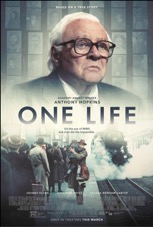One Life (PG)
03/04/24 22:21 Filed in: 2024

Starring: Anthony Hopkins
March 2024
Warning! This is NOT a movie review. This is a critique of the film. Intended to initiate a dialogue, the following analysis explores various aspects of the film and may contain spoilers. For concerns over objectionable content, please first refer to one of the many parental movie guide websites. Ratings are based on a four star system. Happy reading!
One Life chronicles the extraordinary true story of Nicholas “Nicky” Winton (Johnny Flynn), a young stockbroker at a London bank, who rescued hundreds of children from the streets Prague on the eve of World War II.
From a young age, Nicky’s mother, Babette “Babi” Winton (Helena Bonham Carter), instilled in him a desire to help those in need. This “If you see a need, lend a hand” mentality compelled Nicky to help the refugees in Prague. All told, his efforts led to the rescue of 669 children who were transported on eight trains—a ninth train, with over 200 children aboard, never arrived because Hitler’s invasion of Poland ignited World War II. The children from the failed mission, many of whom ended up in concentration camps, weighed heavily on Nicky’s conscience for the rest of his life.
Nicky’s nagging melancholia over the people he wasn’t able to save mirrors the titular character’s plight in Schindler’s List (1993). In a haunting scene at the end of that film, Oskar Schindler (Liam Neeson) laments the fact that he could’ve rescued more people; he calculates how many more lives could’ve been saved had he sold his watch and car. Despite the crushing weight of underachievement, both men secured a lasting legacy, namely the descendants of the people (largely Jewish) they saved.
Fifty years after the rescue effort, old Nicky (Anthony Hopkins) reflects on his earlier exploits, which are dramatized in a series of flashbacks. Nicky’s wife Grete (Lena Olin), tells him it’s time to let go of the past. While she’s away on a trip, Nicky drags dozens of file boxes from his study to the front yard, where he turns the mound of historical documents into a bonfire (an ironic twist on Nazi book burning).
The one item from the past Nicky just can’t bring himself to part with is a leather briefcase that contains a scrapbook of all the children he helped rescue. Nicky presents the scrapbook to a local London newspaper, but a decades-old account of Jewish children being rescued from another country fails to pique the editor’s interest.
When Nicky meets with a museum director, she says the scrapbook is too important for her collection, but asks if she can borrow it. That decision creates a chain of events that brings Nicky face-to-face with his legacy.
I must admit, I knew nothing about this film before I went to see it; Anthony Hopkins was on the poster and I’d gladly pay to hear him read binary code (formerly: from a telephone book) for two hours. A consummate craftsman, Hopkins is, in my estimation, the finest living actor on planet Earth. And, despite only appearing in about half the movie, the octogenarian delivers an authentic portrait of a man tormented by the lives he couldn’t save.
Bonham Carter is also impressive. Unfairly typecast for her off-kilter roles in many of Tim Burton’s films, Bonham Carter is a really good dramatic actress. Here, her “Not gonna’ take no for an answer” characterization is finely-calibrated—Babi’s assertiveness could’ve come off as bullying.
The rest of the cast, including Jonathan Pryce as Nicky’s long-time friend, Martin, and Romola Garai as the spirited leader of the refugee committee in Prague, is also excellent. Flynn has the movie’s most pivotal role as the younger version of Hopkins; fortunately, he’s up to the task and credibly, if not slavishly, mimics the speech and mannerisms of the veteran actor.
Despite a slow start, the story begins picking up steam when young Nicky visits Prague. The crosscutting between the movie’s two time periods helps sustain viewer interest; the mostly urgent, mission-driven scenes set in the late 30s serve as an appropriate counterbalance to the largely contemplative, character-driven scenes set in the late 80s.
Director James Hawes makes the most of his UK and Czech Republic locations, but never quite elevates the look of the film above its modest budget. Still, with a story (written by Lucinda Coxon and Nick Drake, based on the book If It’s Not Impossible…: The Life of Sir Nicholas Winton by Barbara Winton) this strong and performances this good, a bigger budget and more lavish production would’ve upstaged the film’s poignant message.
Though set decades in the past, the movie has more than just a little relevance to current events. With antisemitism on the rise and wars raging in Ukraine and Israel, this film is a timely reminder of the dangers of placating evil and vilifying any race or group of people.
One Life boasts tremendous performances and a riveting true story of courage in the face of unspeakable evil. It’s also a powerful reminder of how many people can be positively impacted by just one life.
Despite its disturbing themes and images, One Life is an inspirational movie that should be seen by everyone…lest we forget the horrors of war and repeat the mistakes of the past.
Rating: 3 out of 4